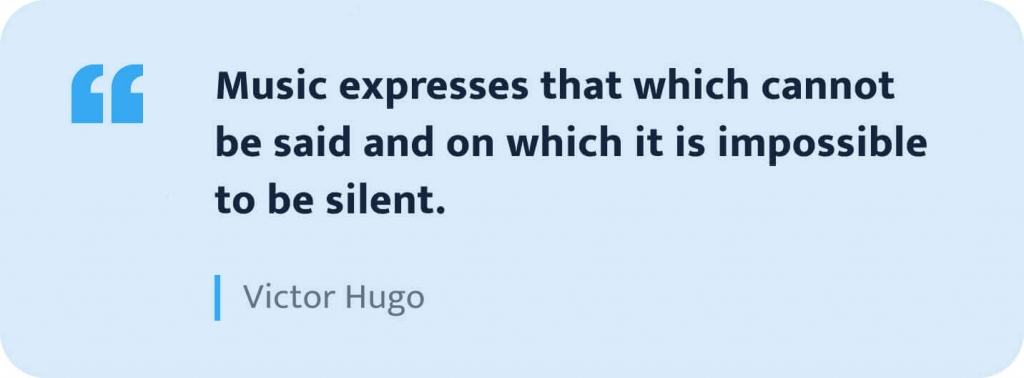Music topics to write about offer numerous opportunities for exploration, from the psychological effects of music on mood to its impact on social movements. At the same time, music essay topics often involve describing a deeply personal experience, challenging to capture in words. Using words to discuss music can feel counterintuitive, as sound itself embodies non-verbal communication.
This article will be helpful to anyone who needs to write a paper about music. It begins with a list of trending music essay topics, followed by an overview of various music assignment types.
The next section provides a categorized list of music topics to write about tailored to different essay genres:
- Argumentative
- Persuasive
- Classification
- Expository
There is also a section focused on musical history essay topics. Finally, custom-writing.org experts have prepared a comprehensive guide on music essay writing and a paper example to inspire you to start working on your assignment.
- 🔝 Music Essay Topics: Top 10
- 🎵 Music Assignment Types
- 💡 Argumentative Essay Topics about Music
- 💬 Music Topics to Talk About
- 🖊️ Persuasive Music Topics to Write About
- 🎓 Music Topics for College Essays
- ❓ Research Questions about Music
- 🎼 Other Music Essay Topics
- ✨ Reasons Why Music Essays Matter
- 🎯 How to Choose a Topic
- ✍️ Outlining & Writing Guide
- 📃 How to Write a Topic Sentence
- 🎹 Music Essay Vocabulary
- 🔗 References
🔝 Top-10 Music Topics to Write About
- The evolutionary purpose of music
- Emotions evoked in ternary vs. rondo forms
- Music’s role in shaping social connections
- The science behind the benefits of singing
- Ethnomusicology’s role in modern film scores
- How do recording formats influence the sound?
- Do pump-up songs help enhance sports performance?
- How did the ways in which we play music evolve?
- How do school musicals help build confidence?
- Explore the effects of sound waves on mindfulness
🎵 Writing about Music: Main Assignment Types
A music essay describes or analyzes a piece of music, its context, or one’s personal attitude towards it. This type of assignment requires a compelling primary argument and a clear structure. Writing on music is a popular assignment in high school and college.
Here are the typical tasks that you might receive:
- Concert report. This assignment requires describing the music you’ve heard using as many details and terms as possible.
- Historical analysis of a piece. Your aim with this task is to describe the historical context of a piece or its relation to the setting. For this type of assignment, you may need to do comprehensive research.
- Song analysis. In this type of essay, you explore song lyrics’ meaning and show how they work together with the melody.
- Performance or media comparison. Here, you need to compare several interpretations or performances of one piece of music.
All of these assignments require a different approach and topic. You will find topics for these types of tasks below.
💡 Argumentative Essay Topics about Music
When it comes to music, argumentative essay topics are usually concerned with a specific music-related issue. Choose any of the ideas below and make sure to examine both sides of the phenomenon using facts:
- The influence of modern technologies on the music industry. Technologies allow artists to create and promote their songs independently. Because of this, record labels are less critical to musicians than before. However, the emergence of new technologies also gave rise to piracy. Do the positives outweigh the negatives?
- What’s the effect of pop music on the modern generation? Today’s pop songs are usually commercial. Because of this, some people say that pop has ruined the current generations’ perception of music. Others argue that contemporary pop music expanded the possibilities of the genre.
- Rock music makes people more aggressive. Some consider rock music merely an arrangement of aggressive tunes that foster violence. On the counter side, science has proven that people who prefer rock to other genres are calmer and more concentrated. Which position do you agree with?
- Can people with hearing impairments become famous musicians? Many believe that access to fame and fortune is limited for disabled people. The deaf may seem especially unsuited for the music business. Yet, the examples of Beethoven, Neil Young, and Chris Martin show that hearing problems don’t have to be an issue.
- Will streaming completely substitute physical copies? Digitalization is on its way to replacing LPs and CDs. For most people, it’s simply more convenient. But their opponents claim that an MP3 file can never sound as good as a physical copy.
- Some music genres can be a catalyst for violence. While their beats may be calm, hip-hop and rap’s lyrics are often aggressive and brutal. Does it have adverse effects on a listener?
- Can a person become addicted to music?
- Censorship on the radio: why stations shouldn’t bleep out obscenities.
- Is mandatory musical education in high schools practical?
- The impact of Mozart’s music on toddlers.
- Should a musician’s personal life affect people’s perception of their art?
- How susceptible are teenagers to political messages in songs?
- Music influences one’s mental and physical capabilities.
- Are children who listen to music more intelligent than others?
- Music genres are inherently dependent on musical instruments.
- Is music as an art form more popular than cinema?
- Debate whether rap musicians promote a frivolous and careless lifestyle.
- Many musicians became famous only because they’ve had connections.
- Music festivals are the best form of entertainment.
- Does music always sound better live than on records?
- Is classical music better than modern genres?
- Is it justified that some religions view music as a sin?
- Typically, music defines a culture and its traditions: true or false?
- Rap music has a strong connection to rebellious movements.
- Jamaican music’s link to the stoner lifestyle is unjustified.
- Synesthesia: how is music related to visuals?
💬 Music Topics to Talk About
Music speech topics can be about anything at all, from your favorite genre or the history of a specific musical instrument to the science behind earworms. Check out the engaging ideas below:
- Music therapy can help people with mental illnesses. It’s a well-known fact that music affects the human brain. This ability makes it perfect for treating mental health problems. On the one hand, psychologists established that listening to classical music increases one’s cognitive capacity. On the other hand, listening to heavy rock impacts responsiveness.
- The questionable treatment of women in the music industry. While it may seem that both sexes are treated equally, women still earn much less than they deserve. Moreover, the extreme sexualization of girls persists as one of the most pressing problems in the industry.
- Which musician or band impacted your worldview? Discuss what makes your favorite artist special. Consider analyzing their lyrics, genre, and evolution. If you want to, add a review of one of their albums.
- What are the challenges of being an independent artist? Typically, independent artists deal with all the financial, promotional, and distributional affairs by themselves. In the increasingly complex music business, this is not an easy task.
- Is social media efficient for promotion? Almost every modern artist uses social media to promote their albums or songs. Users often check their networks for updates, which increases the musician’s visibility. But do such methods help in the long run?
- Passion is the essential personal quality for every musician. If an artist is not eager to continually produce high-quality output, they’re unlikely to succeed. However, qualities such as responsibility, honesty, hard work, and creativity are also vital.
- Is music good for stress relief?
- How does music connect people?
- Analyze qualities that good musicians shouldn’t have.
- Who are the most excellent musicians in the country genre?
- Is it possible to live without interacting with music?
- Choose three successful rappers and analyze their influence.
- How can a musician become famous without having money or connections?
- What are the difficulties of being in a band?
- Who impacted the development of indie music the most?
- Is pop music losing its popularity? If so, why?
- Three factors that affected your choice of a favorite genre.
- Which artists are the most prominent in power metal?
- Which record label is the most influential now?
- Can Justin Bieber’s songs be considered legendary?
- Did Kanye West introduce a new kind of rap?
- Which rock bands lost their fame because of a scandal? How did it happen?
- Discuss Dire Straits’ impact on music history.
- Who are currently the most successful women pop singers?
- Why are some music genres more popular than others?
- What does success in the music world depend on?
🖊️ Persuasive Music Topics to Write About
Is there anything music-related you want to convince people of? A persuasive paper is your chance. Consider these essay topics about music for your persuasive essay:
- A seven-string guitar is superior to a six-string one. The additional string gives more room for creativity. It might be challenging to master, but in the end, the music has a fuller sound. Do you think it’s worth the effort?
- The lyrics don’t matter as long as the melody is good. It’s possible to like songs from different countries, even if the listener doesn’t understand the language. The singing is simply part of the composition. Does this mean that what the vocalist says is unimportant?

- Most people living in big cities neglect country music. People from urban areas tend to think that country music is tasteless. For them, its tunes and lyrics sound too simple. Does the strong association with cowboys, farms, and long roads simply not appeal to the city lifestyle?
- Should rap music be performed only by black people? The genre hosts a large portion of African American artists. Not only that, but black rappers are widely considered the best of their craft. Do white artists do the genre justice?
- Music that artists make merely to get money is soulless. Passion is a critical factor for every musician. If money is the primary driver for creating a song, the result is inevitably flawed. Do you agree?
- Pop music is undergoing a transformation. Listeners acknowledge pop as the primary genre of contemporary music. Yet, new musical instruments are changing the game. Even the lyrics touch on more serious topics than before.
- Indie is the new pop. Indie music is a relatively novel genre. Still, it continues to gain popularity. The light-hearted tunes paired with existential lyrics have captured the audience’s hearts. Is it possible to envision the future of music without bands such as Coldplay, The 1975, and the Arctic Monkeys?
- The meaning of freedom for jazz as a musical genre.
- Punk rock has recently witnessed a renaissance.
- Exposing plants to classical music makes them grow faster.
- Classical music: intellectually stimulating or relaxing?
- Is it justified that some countries legally prohibit artists from performing?
- Is it easier for children to learn with music?
- Can a person ever become a great artist without a natural talent?
- Should workplaces allow their employees to listen to background music?
- Jimi Hendrix’s guitar skills are still unmatched.
- The impact of pop music on European culture and trends.
- Kurt Cobain’s death should have been a wake-up call for the music industry.
- Why is music beneficial to society?
- Nusrat Fateh Ali Khan’s legacy can be felt even today.
- Nintendocore is a legitimate genre that the industry should take more seriously.
- Should you listen to a bands’ music even if you disagree with their opinions?
- Musicians should receive more government support.
- Patriotic songs make people feel passionate and energetic about their country.
- Depressive and sad tunes can worsen a person’s mood.
- Doctors and therapists need to understand the importance of music.
🎓 Music Topics for College Essays
When you apply to your dream college, you need to write an impressive essay. Writing an essay about “music in my life” is a great way to demonstrate your passion and creativity. Choose one of these topics for your college essay:
- The role of music in your life. Describe what music means to you, how often you listen to it, and how it helps you in life. For example, you can write about inspiration, motivation, or the sense of freedom that it gives you.
- What are the essential aspects of music for you? Try to write down everything you like about music. It might be melodies, lyrics, vocals, or mood. You can choose several aspects if you feel that you can’t decide.
- The time when music changed your life. In this essay, you can pick one occurrence or describe how music changed your life gradually. It’s important to indicate where you started from and where it led you.
- How do you see the future of the music industry? Demonstrate to the admissions officer how well you know the art and the business.
- Your role model in the music industry. You may write about the qualities of the person you admire and why you want to develop them in yourself. Remember that admission officers want to read about you, not your idol.
- How did your musical taste change over the last ten years? Describe the evolution of your preferences. Explain why you have changed some of your past choices. Do you think your musical taste has improved?
- Your favorite musical genre.
- Does listening to music help to heal body and spirit?
- What is the best music performance you have ever seen?
- Why do people become fans of particular musicians?
- Your favorite song lyrics.
- Can people be judged by their musical taste?
- Why is music an essential part of human culture?
- Quote about music that appeals to you the most.
- How can music education help you in the future?
- Do you prefer listening to music or performing it?
- How can music change your mood?
- Why you want to become a musician.
- Which culture has the most beautiful ethnical music?
- Is music more of an art or business?
- What are the essential parts of musical education?
❓ Research Questions about Music
Coming up with good topics can be challenging, especially with a looming deadline. To help you out, we’ve made this list of exciting research questions about music that you can cover in your paper:
- How are popular culture and music connected? Explain how the current culture influences the musical scene and how this can be observed.
- What’s the influence of music on society? Does music have a calming effect on the masses, or can it entice violence and social discord?
- Can music be used as a propaganda tool? For this essay, compare the use of musical compositions in democratic and authoritarian regimes.
- Which traits connect different musical genres? Here, you can try to pinpoint features characteristic for all types of music.
- How does a nation’s culture influence its music? In this paper, discuss how separate cultures treat the same musical styles in different parts of the world.
- What are the standard features of modern music? Your essay could explain the most common melodies, beats, and vocal styles in contemporary music.
- Has technology made modern music better? Write a paper on using software in composition and songwriting.
- Can AI replace human composers? Imagine a future where most of the music will be made by artificial intelligence. What would it be like? Describe it in your essay!
- Which musical styles are the most popular in the US? Here, you can highlight the music styles Americans like best. What do they tell about the country’s culture?
- How does the environment shape a person’s musical taste? For this paper, we recommend studying the ways upbringing and close social groups form an individual’s musical preferences.
- Can music effectively convey political messages? In this essay, explain the merit of musical bands in spreading political rhetoric.
- Which musical genres disappeared in the last 100 years? Write an essay on music styles that have vanished during the previous century. Why did this happen?
- Should some types of music be banned? Can censorship help deal with violent and disruptive behavior? Discuss it in your paper.
- What are the main similarities between classical and modern music? Develop a comparison that shows the common features between contemporary hits and oldies.
- How does music affect the brain? Try to detail the effects of different musical compositions and styles on the human brain.
- Why should children learn about classical music? Here, we suggest exploring the merits of teaching high school students about classical compositions.
- Is it possible to write good music without knowing the theory? Using several real-world examples, tell if it’s possible to be a great composer without theoretical knowledge.
- Which traditional musical instruments do people still use? Write about any traditional instrument. What makes it so enduring?
- What’s the influence of music genres on one another? Take two genres and describe how they impact each other.
- What role do women play in the modern music industry? What are the most prominent positions women hold in this area? Do they have the same opportunities as their men counterparts?
🎼 Other Music Essay Topics
- Why do supermarkets play music? Think of the reasons why marketers use music in advertising and how it impacts customer behavior.
- An analysis of Robert Wise’s The Sound of Music. Evaluate how the director uses music to tell a story.
- The impact of music on the human brain. Examine the latest research in the mental health field and how music therapy affects depression treatments.
- The workings of the music industry. Assess how contemporary audio technology and touring lifestyle affect musicians.
- The role of music in different cultures. Choose and compare two countries to analyze their perspectives on the music industry.
- Music on television. Evaluate how the music of TV shows and movies impacts the audience’s feelings and behavior.
- Oliver Sacks’ contribution to music psychology. Explore the theories he discusses in Musicophilia and describe its influence on music psychology.
- Should all music be available for free download? Think about the ethical and legal aspects of this issue.
- How did music psychology help the development of music education? Try to find a correlation between these two fields.
- Britney Spears and the adverse effects of teen popularity. Writing about this topic, you might want to focus on how her early fame affected her life. What happened after her famous breakdown in 2007?
- The half-life of one-hit-wonders. Focus your paper on quantitative research. How long do one-hit-wonders stay famous on average? Why do they fail to maintain their success?
- Journalism and the music industry. Examine the effects positive or negative press had on a musician of your choice.
- Festivals and sponsorship. Discuss the benefits that corporate sponsors and the creators of music festivals gain from working together.
- Rock songs and pessimistic lyrics. Why do most popular rock songs have such sad and angry lyrics?
- Discuss the development of your music taste. Write about what pushed you to change and how it influenced your life.
- The psychology of music. Examine what someone’s favorite music genre can tell about their personality.
- Is ASMR music? ASMR artists make quiet sounds to soothe their audience. But can we really consider it music?
- A historical analysis of jazz. Explore how African Americans influenced the flourishing culture of jazz that has spread worldwide.
- The effect of classical music on children’s cognitive abilities. Supposedly, classical music is great for kids. Study this theory and make your conclusions.
- Discuss the characteristics of modern Latin American music. Dive into its diversity and describe the reasons for its popularity.
- How do Chinese artists make traditional music? Write about its complex creation process. Analyze the importance of articulation for composers.
- The history of music. With this essay, explore the six periods of music history. To top it off, you can predict what music will be like in the future.
- The international music festival event industry. Assess this business environment and its potential profitability.
- The magic of instrumental music. Pick your favorite orchestra pieces and find unique features in each of them.
- Musical education: the sound of success? Does everyone need a musical background?
- Explore the latest techniques in songwriting. Look into the song creation process of contemporary musicians. How do they get the audience to enjoy their art?
- Compare and contrast e-pianos and keyboards. In doing so, consider their structure, sound, and features.
- The Woodstock festival as a game-changer. How has the Woodstock Music and Art Fair influenced the current state of the music industry? Additionally, investigate how current festivals hold up to the standards set by Woodstock.
- Music therapy for stroke patients. Find out whether incorporating elements of music therapy can support the treatment of patients who suffered a stroke.
- How do amplifiers work? If you’re a musician, you’ve likely used an amplifier before. Now it’s time to figure out what they are actually doing.
- The Killers’ contributions to indie rock. How would you define their style of music? What makes them a key player in indie music?
- Analyze the music in Grease. Pick some of the most popular songs from the musical and write about their influence on American culture.
- What’s the best way to interpret songs? Describe methods to deconstruct songs and how the music style affects this process.
- Teufel vs. Sennheiser: the ultimate comparison. German sound equipment manufacturers are known for their cutting-edge technologies. But which brand is the best?
- What role does harmony play in music composition? Choose several pieces of music and describe how the artists used harmony.
- How necessary are double bass drums? Do musicians place them on stage just to impress people, or do they have actual use?
- Compare regular festivals and free ones. Why spend hundreds of dollars on Coachella if you can go to Woodstock for free? In your essay, focus on the differences such as size, participating artists, and general entertainment.
- A historical analysis of choral music. Singing in groups is a practice common across various cultures. You might choose one or two to work on.
- How did The Rolling Stones influence British culture? The Rolling Stones are one of the longest-standing rock bands of all time. Naturally, this left significant marks on their home country.
- How important are regional accents for English-language singers? When working on this theoretical topic, include some examples and your personal opinion.
- The world of musical instruments: medieval music. This fun essay can focus on different types of medieval instruments and their evolution.
- Does the creative process differ for electronic and acoustic music? Look at how artists usually write songs. Do they start with the melody, the rhythm, or the lyrics? Does it depend on the medium?
- The correlation between poems and medieval songs. Find out how composers were reinventing poetry to create songs.
- Hip-hop and gender equality. What is the role of women in the development of this music style? Don’t forget to give examples.
- When politics interferes with art: Eurovision. Analyze the role of the political situation in this song contest. Is there anything left of its original idea?
- How did Vladimir Vysotsky become a beloved musical figure outside of Soviet Russia? It’s unusual for Russian-language musicians to gain fame outside of their home country. Research how Vysotsky managed to mingle in the USA and have some of his work posthumously released in Europe.
- K-pop conquers the world. You may narrow the topic down to a specific artist. Focus on the influence of Korean music in other cultures.
- Music school students vs. amateurs. Discuss the different experiences and outcomes of music school students and those who learn to play instruments at home.
- Do music choices shape one’s identity, or is it the other way around? It’s an exciting question that lets you dig deep into the psychology of music.
- The music of dissents. Energizing songs play an essential part in rebellions and revolutions. For example, analyze how protesters used music during the Arab Spring.
- The development and popularity of electronic music. Starting from the early experiments, analyze the development of this style and its increasing influence
- How do artists use social media to promote their music? You might want to choose one or two examples to illustrate the tools they use.
- Organum as one of the oldest written types of music. Study the development of this music style throughout various cultures.
- The appeal of Metallica’s Nothing Else Matters. Many people consider the song one of their favorites. Examine its structure, melody, and lyrics. What makes it unique?
- Africa’s hidden musical gems. African music is as diverse as its people. Pick two countries and compare their style. How do they differ from Western art?
- Did people’s music tastes improve compared to previous decades? Here, you have the chance to express your views on the evolution of people’s music preferences.
- Is the life of pop stars as easy as people think? Share your thoughts on whether famous musicians and singers have a leisurely lifestyle.
- Physiological reactions to different types of music. Study how your body reacts to various beats and tones.
- Why do people tend to listen to specific songs on certain occasions? In your essay, ponder the effects of love songs or powerful anthems on one’s mood.
- What does someone’s ringtone say about their personality? Think about how it affects your perception of a person.
- The impact of music on the individual’s productivity. Studies suggest a positive effect on people’s performance when they listen to something pleasant while working. But all the noise can get overstimulating. That’s why finding the balance is central.
- Music is natural. In the depth of nature, there is music. Rain, a bird’s song, or the tapping of a squirrel’s feet melt together to create a beautiful composition. Music is everywhere—one only needs to listen carefully.
If you haven’t found what you’re looking for, you’re welcome to use our topic generator.
Evaluation Essay Topics About Music
Evaluating music requires attention and concentration, so try to do your best to stay focused while listening. The following topics will help you find an exciting subject for evaluation:
- Did the performers have passion? Pay attention to their emotions, intonation, and body language.
- Did they perform technically well? Here, you need to decide whether they played or sang the right notes, follow the rhythm, and make transitions.
- How well does their performance represent the culture? Think about how the music is relevant to the time period, nationality, and genre they represent. Evaluate the setting, costumes, and other details.
- What were the main flaws? Maybe they talked when it wasn’t necessary, or perhaps someone interrupted the performance. Try to notice everything relevant.
- Was the performance enjoyable? This question involves a subjective opinion, but it’s better to try to answer it as objectively as possible.
Now all you need to do is choose a topic and get down to writing!
- Discuss the rise and fall of hardcore punk. Many bands that started in the hardcore punk scene softened their sound over time. Why did this genre disappear from the mainstream?
- Copyright laws are going too far. It’s getting increasingly difficult to use somebody else’s intellectual property. Creators on YouTube have to fear lawsuits for creatively repurposing copyrighted music. Moreover, laws such as the DMCA are frequently abused to generate revenues.
- More bands should use their influence for political purposes. Renowned artists have a broad reach. Bands like Rise Against or Anti Flag use this influence to raise political awareness among their fans. Is it a fair approach?
- Borrowing and plagiarism in contemporary music. New artists don’t emerge without having listened to other musicians. They draw inspiration from their predecessors. Thus, songs are always a mix of already existing tracks. In your essay, discuss the difference between homage and plagiarism.
- What are the similarities between poetry and song lyrics? Songs and poems are similar in that they deliver a message to the audience. Their creation demands extensive knowledge of rhyming, literary devices, and other components.
- Why do some musicians ask others to write lyrics for them? It is a common practice to have a crew of songwriters who create texts for performers. Sometimes it happens due to a lack of imagination or inspiration. Does finding out that your favorite artist doesn’t write their lyrics destroy the magic of their music?
- How can popular music diversify as a genre? Pop music reached its peak. Adding and borrowing elements from different genres can be one way to diversify a streamlined genre.
- The history of music as political propaganda.
- Explain the difference between high and low contemporary music culture.
- How is contemporary music related to that from other periods?
- What are the connections between pop music and the hip-hop genre?
- What connects popular music and contemporary culture?
- How does music in the United States relate to Spanish music?
- Analyze the evolution of Indian music.
- Discuss why certain albums manage to climb to the top of the charts.
- The link between social classes and musical genres.
- Differences and similarities of music and other art forms.
- How does a musical instrument’s origin influence its development?
- What is the role of traditional music today?

- What are the main processes in music production?
- How is music theory relevant today?
- Analyze which contemporary artists’ albums had an effect comparable to that of Queen’s A Night at the Opera.
- Eurodance: Europe’s most extravagant genre.
- Songs and everyday life of Michael Jackson vs. Madonna: who wins the ultimate pop crown?
- What difficulties has Eminem faced throughout his career?
- Over-ear headphones provide a better sound experience than on-ear ones.
Expository Topics About Music for an Essay
An expository essay explains or describes a subject. In the colorful world of music, topics can range from the physics of sound waves to artists’ social impact.
- The importance of Blues music in the late 19th century and now. Blues originated in the 19th century American South. It was an outlet for African Americans to express their sorrows. Later, it exceeded by far the cultural boundaries that confined it.
- The role of music in prison camps. Singing was an essential part of life in the Nazi concentration camps. One of the most well-known songs of that time is called Peat Bog Soldiers. In your expository essay, explore why prisoners started singing and how it developed.
- How did Chester Bennington’s death impact the music industry? Linkin Park was a giant in the business for decades until depression made their lead singer take his own life. The event sparked debates surrounding mental health and pressure in the creative industry. What long-lasting effects did these discussions have?
- How did Baroque music reflect the zeitgeist? Compared to the Renaissance period, Baroque was in all aspects very pompous. The artists of the Sun King’s time didn’t shy away from the extravaganza. This ideal is especially prominent in architecture. How does music fit into the picture?
- Investigate the development of musical harmony. The Ancient Greeks already had an idea of some tones fitting together better than others. However, it wasn’t until the 1600s that tonality became a crucial part of music theory.
- Music in commercials: an analysis. Songs and jingles are commonplace in TV commercials. But what are they good for? In your essay, you can compare the success of advertisements with and without music.
- What causes music trends to change? It’s easy to define various eras of music. Naturally, the invention of new instruments has influenced this development. What other factors played a role in these transformations?
- Why is 4/4 a universal beat?
- Examine the origins of The Star-Spangled Banner.
- The effects of dissonance on the human mind.
- How do staccato, legato, and other forms of articulation influence the perception of a musical piece?
- Discuss the significance of music in video games.
- Music drives people’s motivation.
- Explain the calming effects of nature sounds.
- How does music influence literature?
- Celtic music is known to have an extraordinary impact on the psyche. How does it work?
- How does music impact the discharge of hormones such as dopamine?
- Music therapy is suitable for those who have bipolar disorder.
- What made Falco such a unique artist?
- How does the perception of a silent film differ from that of a movie with sound?
- A rock concert by Kansas: How the relevance of live concerts changed over time.
- Is being able to read music important for a composer?
- How did Beethoven write music after losing his hearing?
- Should all songs have proper rhythm and structure?
- Why do so many indie artists become commercial?
- Is it essential for song lyrics to rhyme?
Historical Topics about Music
If want to write a paper about the evolution of music, you’ve come to the right section. Songs and melodies have been part of human culture for millennia. Dive deeper into this exciting subject with one of the following ideas:
- How did the Catholic Church influence music development in Europe? During the Middle Ages, religious movements had a significant impact on music. Consequently, composers used to create more sacred music. It became a way of personal expression since it often contained religious texts.
- The cultural meaning of Renaissance music and its influence on other styles. During the time of the Renaissance, sacred and secular music heavily impacted each other. As a result, more variety emerged. The chanson and madrigal, for example, became popular around Europe.
- Research archaeological findings of early musicality. The search for the oldest musical instrument delivers thrilling insights. Archaeologists have excavated a flute made of ivory and bird bones, dating approximately 43,000 years ago. They found it in a cave in Germany where Neanderthals lived.
- History of early music and appearance of musical instruments. The beginning of the human culture was the turning point of musical instruments’ appearance. They were primarily used for spiritual rites; typically, they were horns or drums for ceremonies.
- Louis Armstrong’s contributions to the jazz world. Jazz originated in New Orleans and was a favorite among African Americans. Louis Armstrong’s improvisations forever changed the genre, making the soloist-improviser the center of the performance.
- The phenomenon of pop music and its origins. Popular music dates back to the second half of the last century. It comes from the US and the UK. Its main peculiarity lies in the variety of tunes and lyrics.
- Native American music before the discovery of the New World. Incas and Aztecs had particular styles of music. Findings show that these ancient civilizations used instruments for ceremonies. Researchers also discovered that various American cultures mingled, thus creating new techniques.
- The use of string instruments in classical Greek songwriting.
- Famous composers of 18th century Italy and their influence.
- Mozart vs. Beethoven: comparison of techniques.
- Deliver a thoughtful analysis of Beethoven’s Fifth Symphony.
- What role do acoustic instruments play in jazz compositions?
- Explore the history of the Ocarina.
- Due to what circumstances did Wolfgang Amadeus Mozart become one of the greatest musical geniuses in history?
- Influence of the Romantic period on modern music.
- How and why were the swing era and jazz connected?
- Rock and roll as an international language in the 20th century.
- Explore the rise of techno music.
- Is there a historical connection between music and math?
- How did music become a staple subject in many schools?
- The greatest musicians of World War I.
- Industrialization and its effect on music development.
- How did female producers such as Kate Bush impact the music industry?
- Analyze Frédéric Chopin’s contribution to classical music.
- Music evolution in ancient Greece vs. the Roman Empire.
- How does archeology help to uncover musical traditions?
- Tupac’s influence on modern rap music.
Classification Essay Topics about Music
In a classification essay, you analyze a relationship between several categories based on a defining characteristic. For example, you can classify music by genre, mood, or instrumentation. Here is our list of music topics for this essay type:
- The most popular types of alternative music among teenagers. Naturally, teens like different kinds of rock and experimental music. Try to dig deeper and ask some teenagers about their preferences to get a clear picture.
- Types of modern dance music. Describe the tendencies and popular genres. You can also focus on a specific country.
- The most popular types of jazz music in Europe. Although jazz emerged in the United States, this genre became recognizable all over the world. You can analyze the most popular streamed songs, or the concerts and other mass events.
- Rock music in the 70s. You can describe the genres, styles, or types of performers. The concerts, clothes, and lifestyles are also suitable for this topic.
- Blues musicians of different time periods. Analyze the lyrics, the musical instruments they used, and how long their careers lasted.
- Classification of music for children. Some of it can be for dancing, development, or just listening. Research the purposes of different kinds of music for children.
- Types of music used in films. The soundtrack is one of the main things we remember after watching a movie. There can be popular songs or tracks composed specifically for a film.
- Rock bands that represent different subgenres.
- Rap subgenres in the United States.
- Periods of classical music.
- What motivates people to start a musical career?
- Different kinds of music for relaxation.
- The industries where composers work.
- Types of opera singers and instrumental music.
- Different professions in the music industry.
- Unpopular genres of independent music.
- Different types of music listeners.
✨ 4 Reasons Why Music Essays Matter
Essay writing is an essential academic exercise for all educational spheres, including music education. A music essay is more than an analytical tool for analyzing melody or reviewing composition. It can also advance students’ understanding on a deeper level and build their broader musical competencies across various aspects.
Here’s what music essays can help students with:
- Understanding and appreciation of music. Writing allows you to explore the context of the musical piece in more depth. You learn to differentiate various musical elements, identify genres, and name the styles of influential composers.
- Analytical skills. Synthesis of diverse academic evidence and its combination with first-hand analytical insights and impressions is a vital skill for all music students. It aids in deciphering the key components of musical compositions and building new knowledge across various disciplines.
- Writing mastery. Coherent and persuasive writing is instrumental at all levels of study. Those who master academic writing fundamentals will improve their communication and persuasiveness in general.
- Cultural exploration. Music essays enable students to discover the musical traditions of different regions, cultures, and historical periods to build a more comprehensive body of knowledge about the richness of musical heritage.
🎯 How to Choose a Music Essay Topic
To find a suitable music essay topic, take the following steps:
- Analyze your relationship with music. What role does it play in your life? Your topic choice might be different if you are a musician or a listener.
- Think about how music influences your everyday life. For instance, you can study how listening to music affects our mental health. Impressing your readers with some historical facts from the world of music is also a great idea.
- Try reflecting on the role of different music genres in your life. Whether you prefer rap or classical music, exploring a genre is an excellent idea for a paper. Topics related to musical instruments are also worth attention.
- Narrow your topic down. Otherwise, it will be too difficult to focus your essay on just one idea.
✍️ Outlining and Writing Your Music Essay
So, you have chosen your essay title. Now it’s time to start writing! But before you begin, read the sections below and learn how to organize your work.
Music Essay Introduction
The introduction is the section where you provide a brief yet informative explanation of the topic. This section must capture the reader’s attention and smoothly leads them to the essay’s subject. To achieve that, you can start with a compelling quotation, definition, or short statement that will make your audience want to learn more.
Next, you should provide some background information to establish context. Finish up your introduction with the thesis statement that outlines the key ideas explored in the body paragraphs. It needs to be specific and concise (no longer than two sentences.)
Below, we will examine several examples of thesis statements for music essays.
Music Essay Thesis Statements: Different Types
Different types of essays require different thesis statements. Let’s take a closer look:
Analytical essay
In this kind of paper, you need to evaluate an issue or idea. It can be a review of a concert or music piece.
Example:
Pink Floyd’s use of multimedia in The Wall enriched the listener’s experience and created additional meanings.
Expository essay
Here, you should to explain an idea, problem, or opinion to your readers.
Example:
Modern rap performers influence behavioral patterns among teenagers through their lyrics and visuals.
Argumentative essay
An argumentative thesis aims to introduce a claim and justify it by using evidence.
Example:
David Bowie became one of the most significant musicians of the 20th century by mastering various music genres.
Music Essay Body
Your essay’s body is the most significant part of your writing. Here, you provide evidence and explanations of your claims. The most important thing to remember when writing your paragraphs is that each one should be connected to a specific aspect within the thesis statement. Remember not to merge several aspects into one paragraph and steer clear from writing about something that’s not stated in the thesis.
The typical body paragraph structure includes:
- A topic sentence stating the argument you’re going to unpack. This is a key part of every paragraph—make sure to read the section about topic sentences in this article to learn more.
- An introduction to the evidence you gathered to support an argument.
- Quotes and facts (don’t forget about proper citation!) and their explanation.
- A connection between the evidence and the essay topic.
- Paragraph transitions leading your reader to the next section.
Music Essay Conclusion
When writing a conclusion for your essay on music, you can use the following structure:
- Summarize the text in a few sentences.
- Review the key points of your paper.
- Paraphrase the thesis.
To make your essay conclusion more effective, avoid the following:
- Don’t simply restate your thesis. Try to paraphrase and analyze it, and add some information from the body paragraphs.
- Don’t repeat yourself. You don’t have to fully paraphrase your thesis statement. However, you can mirror it in some way.
- Don’t end your essay with a question. It’s like finishing a movie with an unsolved problem. It’s also better to avoid rhetorical questions as they are not specific enough.
- Don’t use quotations. You can use quotes in the introduction or body paragraphs, but make sure to use only your own words in the conclusion. Otherwise, the readers might think you don’t have a personal opinion on the topic.
Citing Music Sources
Like any other academic writing piece, a music essay should be built on the solid basis of prior research. You will need to rely on external evidence and give proper credit to the authors, performers, and reviewers of the analyzed musical piece. Proper citations are vital in this case since they address several goals at once:
- They show that you treat external sources ethically and give credit to all authors;
- They verify your solid referencing skills;
- They allow readers to check facts and sources.
Here is a generic outline for including vital source-related data in your references when you need to cite lyrics in an essay:
- Indicate the songwriter’s or composer’s name.
- Name the piece’s title.
- Type the quotes from the lyrics in quotation marks with line breaks.
If your source is a text (such as a critique, review, or analysis,) follow these steps to cite it:
- Write the author’s name, together with their professional title and credentials, if available.
- State the year of the article’s publication.
- Separate the quotes from external sources with quotation marks and cite the author’s name in the assigned referencing style.
📃 How to Write a Topic Sentence about Music
When working on an essay, you should introduce the readers to the main idea of each paragraph and demonstrate how it will support the thesis of your music-related essay.
That’s where topic sentences come into play. They are placed at the start of a paragraph where they summarize its focal point. With their help, you can reinforce crucial arguments, make a transition, or present new questions about the subject.
There are 6 steps to writing a great topic sentence:
- Develop a thesis statement.
It’s essential to define what the work will be about before developing topic sentences for each paragraph. - Outline the essay.
Having a plan on hand will help you better arrange the content of your papers. This way, you’ll have a clear idea of how to fill each paragraph with supportive evidence. - Make it clear and concise.
Topic sentences must have a clear message that conveys the fundamental idea of a particular paragraph. - Offer an opinion.
Instead of pointing out obvious facts, try presenting your own viewpoint that will grab the reader’s attention. - Use specific words.
The topic sentence must be clear. Make sure you can dedicate the rest of the paragraph with arguments supporting it. - Seamlessly transition between paragraphs.
A well-structured topic sentence will tie the paragraphs together and improve the essay’s flow. Transition words remind readers about the content of the last part while introducing them to a new section.
To simplify the writing process, try our smart topic sentence maker.
Topic Sentences about Music: Types with Examples
There are 3 types of topic sentences you can use for your essay:
Type 1: Interrogative
Topic sentences of this type can include implicit or direct questions to introduce ideas. They are reserved for less formal writing.
Example:
What role does culture play in shaping musical styles across different societies and regions?
Type 2: Reinforcement
This kind of sentence restates an aspect of the thesis statement.
Example:
Music’s ability to invoke nostalgia and make people remember the past is an unparalleled influence on our collective identity.
Type 3: Transitional
Use these topic sentences to transition between paragraphs and show the connection of ideas.
Example:
Moreover, the seamless combination of traditional and modern elements in contemporary pieces shows the ongoing dialogue between the past and the present.
🎹 Music Essay Vocabulary
The better you master the music essay vocabulary, the more nuanced and vivid your analysis will be. Try to avoid cliché phrases like “beautiful” or “pleasant,” as they add no real value to the piece’s understanding. Instead, use more specific descriptive words. This will let you communicate the analyzed work’s essence, tone, and emotional landscape in greater depth and detail. T
Here are some of the terms that you can use in your essay to make it more effective:
- Tempo is the “speed” of music. There are fixed expressions to define tempo—for example, largo, moderate, or presto. You can also describe how fast the music feels.
- Timbre is the term that evaluates the “color” of music. Even if two instruments play the same note of the same volume, the sound is still different. This is how you can notice the color of the tone. For example, gentle, clear, heavy, or warm can be the adjectives to describe timbre.
- Dynamics define the volume levels of music. The volume can be the same all the time, for example loud or soft. If the volume of music changes, you can use such expressions as “gradually gets louder” “or suddenly becomes soft.”
- Harmony characterizes how all the notes and chords sound together. The sequence of chords—chord progression—defines how satisfying the melody is for the listener. For example, if the transitions are smooth, you can use such words as “relaxed” or “warm.”
To describe music more effectively, follow these pro tips:
- Make a comparison. Explain which characteristics of a piece remind you of another one. It’s better to avoid comparing music from different composers in this case. Instead, evaluate and analyze two musical pieces from the same composer.
- Describe the melody and dynamics. You may want to use musical terms to show your knowledge and proficiency. Define the genre and what kind of instruments and tones are used.
- Explain how it makes you feel. You can use basic human emotions to describe the feelings of a listener. For example, it can be anger, tenderness, irritation, excitement, or nostalgia.
- Use metaphorical language. You may try using your imagination to create analogies. Be careful not to make your metaphors overcomplicated, as it may confuse the readers.
Now all you need is to turn the music on and get down to writing! We hope you liked this guide. If you did, don’t hesitate to share it with your friends.
Further reading:
- How to Write a Good Critique Paper: Killer Tips + Examples
- How to Write an Art Critique Essay: Guidelines and Examples
- How to Write a Movie Critique Paper: Top Tips + Example
- Modern Fairy Tale Essay: How to Write, Topics and Ideas
- 200 Creative Topics for Opinion Essays
- 182 Free Ideas for Argumentative or Persuasive Essay Topics
- 180 Excellent Evaluation Essay Topics
🔗 References
- Writing about Music | Harvard.edu
- Music: UNC Writing Center: University of North Carolina at Chapel Hill
- Sound and Sense: Writing about Music: Colorado State University
- Music analysis Research Papers: Academia.edu
- The Power of Music Therapy: Belmont University
- Musicology: Areas of Study: Indiana State University
- Music Facts: Facts.net
- Music History from Primary Sources: Library of Congress
- A History of Classical Music: Part 1: The List
- What Is Jazz: Smithsonian Institution
- Ethnomusicology: University of Oxford
- Music Research Process: Syracuse University
- Journal of Popular Music Studies: University of California Press
- The History of Pop Music in 5 Defining Decades: The Culture Trip
- Music of the 20th Century: Lumen Learning
- Explainer: Indie Music: The Conversation
- Your Brain on Music: University of Central Florida
- Music and Health: Harvard University
- The Psychological Function of Music Listening: NIH
- Essays that Worked: Hamilton
- Writing in Music: Writing Thesis Statements: The City University of New York
- Academic Writing about Music: University of Denver
- How to Write Song Lyrics: Berklee
- Essay Introduction: University of Maryland
- Tips and Examples for Writing Thesis Statements: Purdue University
- Some Tips for Writing Efficient, Effective Body Paragraphs: University of California, Berkeley
- Writing a Paper: Conclusions: Walden University









![298 Hottest Cybersecurity Research Topics & Questions [2026]](https://custom-writing.org/blog/wp-content/uploads/2021/04/hacker-cracking-binary-code-data-security-284x153.jpg)


Thank you very much for this post on music essay writing! You don’t know how long I looked for the helpful information on writing music essays!
Music takes an important part in my life. I wake up and go to bed listening to music. And now when I’m writing my music essay, I also listen to music. And it’s also a pleasure to read an article on how to write an essay on music!